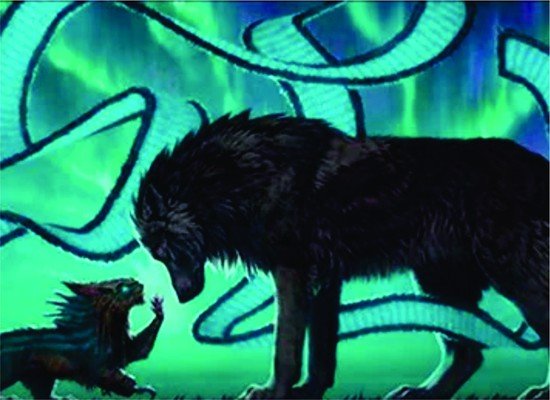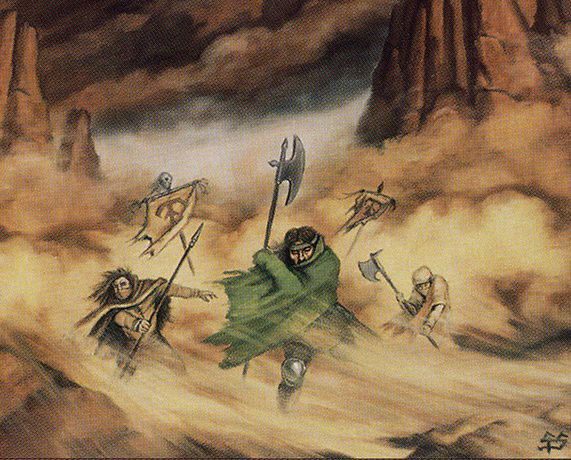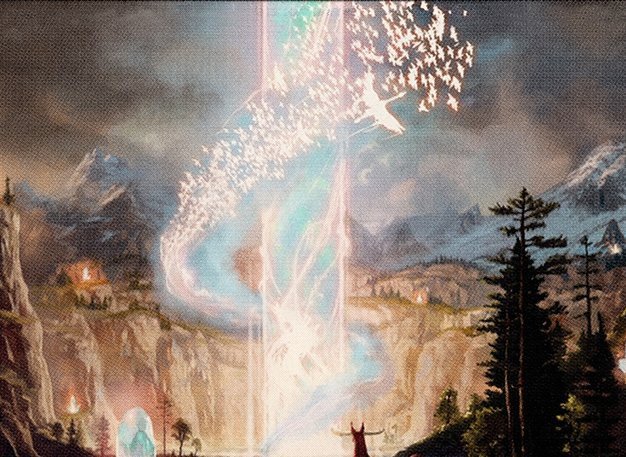Introduction
Kaldheim is before us. The Full Spoiler came out last week and we are only a few days away from the official launch of the edition inspired by Norse Mythology!
But before we do a review of each format, I would like to start this analysis talking about the greater inclusion of this set for competitive formats:

Snow lands are present in Kaldheim and, therefore, become legal in Standard and Pioneer, while they already have great impact in eternal formats such as Modern, Pauper and Legacy.
Ad
Their inclusion in the edition essentially means that they become noticeably more accessible so that players can purchase and use them within their decks, competitive or not.
On the other hand, from a competitive point of view, there is simply no or almost no reason for a player to choose not to use snow lands in their mana base if this is possible due to the mere psychological aspect and range of possibilities that this can open up for players on both sides of the table.
This tactic is very common, for example, in Pauper where you open the game with a Snow-Covered Island potentially means that you are playing Izzet Faeries, when you can literally be playing with any other list.
Thus, within the next few years, it is possible that we will "retire" the conventional basic lands of most competitive decks and, although this option is controversial and may require players to invest more money in basic lands for the mere psychological factor, I prefer to just think that there are things where what we think becomes irrelevant and that we can only accept things as they are.
And, in my opinion, the question of the Snow Lands comes exactly in this consensus.
Another point I would like to emphasize is that there are many cards in Kaldheim, and it would be humanly impossible to quote, for example, all that will affect Standard without doing an extensive review of the set dedicated only to that format. The same applies to the other competitive formats and we cannot forget the famous "Sleepers", cards that we end up underestimating but that shows great potential even in the first weeks, as it was with Embercleave.
Standard

Reidane, in my view, is a card that is still being underrated by the community.
Although the effect of punishing snow lands seems to be of little relevance (and maybe it will be, it will depend on how many snow lands we will see being used in the format and how much Faceless Haven will have an impact on the Metagame), Reidane's real threat is in her second ability: Making non-creature spells costing 4 or more cost 2 mana more can be extremely laborious to deal with for many decks of the format these days.
Currently, Standard has a significant range of cards that fit into CMC 4 or more: Embercleave, Genesis Ultimatum, The Great Henge, The Akroan War, Ugin, the Spirit Dragon, Into the Story, Vivien, Monsters' Advocate, and others are among the most used cards in the format and having to pay a higher cost for them can be a significant problem for some decks .
In addition, Reidane is a 2/3 Flying creature for 3 mana, which means that she survives a Bonecrusher Giant's Stomp.

I believe Goldpsan Dragon will be the most impactful card in the collection for Standard.
Goldspan Dragon is initially our classic "5 mana 4/4 flying haste dragon" that we saw several times before with Thundermaw Hellkite, Stormbreath Dragon and Glorybringer. And like the other dragons, Goldspan Dragon has an added value of giving you free mana for each turn he is in play, in addition to doubling the value of your Treasure tokens and still having some value if it dies with a removal, since it also produces tokens if it is the target of some spell.
Ad
The dragon will certainly have a lot of value, especially on decks like the Temur Ramp (since it gives automatic setup for Genesis Ultimatum mana the next turn), the versions of Rx Ramp that are coming up with Ugin, the Spirit Dragon and maybe even on Adventures decks.

In Search of Greatness is the card that is asking to be broken from this set, and it definitely already has a possible home in Mono-Green Food.
With the enchantment on the board, it will automatically escalate to 1 in the next turn, which is the cost of Witch's Oven, in 2, it is the cost of Trail of Crumbs, in 3, it is the cost of Old-Growth Troll, at 4 is the cost of Wicked Wolf, at 5 is the cost of Vivien, Monsters' Advocate or Elder Gargaroth and at 6 is the cost from Vorinclex, Monstruous Raider.
The card can still see game in other archetypes and will probably be one of the biggest build-arounds of Kaldheim, but it looks like an easy inclusion within the competitive scenario.

There are many good sagas in Kaldheim, but I highlight Showdown of Skalds for being an effect very similar to another that we already have in the format and which is currently banned: Escape to the Wilds since the card allows you " draw 4 cards "to play the next turn.
However, this is where the comparison ends. Escape to the Wilds allowed you to play an extra land, which in turn helped you to cast the spells revealed on the same turn or the next turn. However, Showdown of Skalds, despite costing less mana, does not guarantee an extra land drop, being a less favorable option to use with many high cost spells on the deck since it can be very complicated to play 2 or more in a single turn.
On the other hand, like many other sagas, Showdown of Skalds interacts very well with an existing staple of the format in the form of Yorion, Sky Nomad, allowing you to generate a lot of card advantage with the Saga and pump your Yorion with the second and third ability.

Faceless Haven is probably the main reason why one- or two-color decks might adopt snow lands in their manabase since the use of a 4/3 Vigilance manland has great value in not being killed by sweepers and establish a clock that needs to be respected, in addition to not die to Stomp and exchange well with Bonecrusher Giant.
I suppose the card could be used especially in mono-colored decks like Mono-Green or Mono-Red, but I wouldn't be surprised if we saw Control variants like Azorius or Dimir adopting manland as part of their winconditions.

I am adding this extra card to the article for the simple reason that Jorn, God of Winter is a more specific version of Wilderness Reclamation, although more fragile and conditional but that, even so, may come to be become a great staple of the format if players find the right shell so they can make use of the "pseudo Time-Walk" that the ability to untap their lands can provide.
Ad
Remember that the other side of Jorn allows you to play snow permanents from the graveyard, including another copy of the Jorn that may have died or been discarded.
It is definitely a card whose mechanic I would try to work within Standard.
Pioneer

Although Doomskar is an equally important card for Standard, I consider it even more important at Pioneer where the main aggro decks are always trying to play low and end the game in very few turns.
With the inclusion of Saw it Coming and Behold the Multiverse in the same set, it is possible to include a very important "bluff" factor for reactive decks, as is the case with Pioneer UWx Control, making the opponent think twice before crowding the board with threats or even choose to do so and end up being punished for it.

Although everyone is aware of the combo of Tibalt's version of Valki, God of Lies with Bring to Light, here I am focusing specifically on the value related to Valki's creature part.
Pioneer is a format where you have access to great discard in the form of Thoughtseize and the use of a low-cost disruption to remove your opponent's removal to, in the next turn with Valki, remove his threat (which preferably it will be a Uro, Titan of Nature's Wrath) with the possibility of still copying it, makes the Impostor an extremely interesting and possibly very efficient card for the format.
It is, by far, one of the cards I'm most excited to test on Pioneer.

As with Standard, Pioneer's Mono-Green Walkers also have an ideal curve for enchantment, starting with Elvish Mystic and Oath of Nissa on 1, Burning-Tree Emissary or Scavenging Ooze at 2, Old-Growth Troll at 3, Karn, The Great Creator or Vivien, Arkbow Ranger at 4 and [[Nissa, Who Shakes the World] ] at 5.
In addition, the enchantment costs two green mana, which means that it generates 2 devotion for Nykthos, Shrine to Nyx, further accelerating the deck's game plan in both mana ramping and playing several permanents in a single turn.
Outside of Mono-Green, the card has the potential to make room in other archetypes like the Gruul Midrange, which also has a great permanent curve with Elvish Mystic at 1, Goblin Rabblemaster at 3, Questing Beast at 4 and Glorybringer at 5, or Naya Winota which has a similar curve of creatures and playing a Winota for free adds a lot of value.

As mentioned above, this creature has a dedicated space in Mono-Green Walkers or in versions of Stompy because it is a 4/4 threat with Trample for 3 mana, which adds 3 to devotion and which, if it dies, can be both a ramp in that turn (a Troll on 2 or 3 being killed can mean a Nissa, Who Shakes the World on the next turn) or a recurring threat, as it can spawn another body.

With the obvious comparison to Birthing Pod, I believe that Pyre of Heroes will not have the expected impact at first on Pioneer, but it is a card that only gets better for each tribal interaction that exists in the format from here on.
Ad
It is not the most impactful card, since today I cannot imagine chains of play that can be fundamentally broken with Pyre of Heroes, but it is the most promising card in the long run.
Modern

In Modern, Valki, God of Lies interacts very well with cards that have the Cascade ability, such as Bloodbraid Elf, which allows you to cast Tibalt's side without having to go to 7 mana, while already serving the plan naturally disruptive that the deck usually has with Thoughtseize and Liliana of the Veil.
Unfortunately, Valki is a very fragile card in Modern because it is the target of a number of other relevant cards in the format like Path to Exile, Lightning Bolt, Lava Dart and even an activation of Wrenn and Six, but it still looks like a good addition to Jund, which, unfortunately, doesn't yet have what it takes to get back to the top of the format.

Birgi, God of Storytelling is a great addition to the format's Storm decks, turning all of your cantrips into "pseudo-free spells", while enhancing the rituals and Manamorphose of the deck, giving even more breath for the archetype.
Its other side, Harnfel, Horn of Bounty, also collaborates with the deck as it is very common for the archetype to have more lands in hand than desired while trying to go off, and the artifact allows you to discard these lands or even a Past in Flames to look for other resources.
In my view, it is a great addition to the archetype.

Realmwalker is very interesting for Modern as the format has large tribal decks in the form of Humans and Spirits, in addition to other fringe options like Elementals and Elves.
And Realmwalker fits all of them like a glove.
In Humans, he is a human creature that offers a constant card advantage, allowing you to use your mana on turns to cast the top cards, while using Aether Vial to play the cards in the hand.
At Spirits, he is a spirit that offers more value to the deck and can be found with Collected Company. I would dare say that all Bant Spirits decks today will start with 4 Collected Company and some number between 2 and 4 Realmwalker.
In Elves, Realmwalker works almost like a Glimpse of Nature in a body, since the deck usually generates a lot of mana and commonly you can mitigate lands and use more and more creatures from the top of the deck, in addition to be a target for Collected Company where the then used Beast Whisperer was not.
I assure you that many tribal decks will try to fit the Shapeshifter on its lists.

Although it didn't seem like a big deal at first, The Trickster-God's Heist has a very interesting value especially on Midrange decks as it allow you to take cards like Uro, Titan of Nature's Wrath and Field of the Dead with the same card, which can often mean the punctual turnaround in the match against the Goodstuff decks.
Ad

I am putting this card because we are already seeing some overreacting by the community in terms of getting Emrakul, the Aeons Torn in turn 3.
The idea works like this: You make a spell with Cascade costing 3 (Violent Outburst, Ardent Plea, Demonic Dread), this spell will pull Tibalt's Trickery because no there is another lower cost spell on the deck. Tibalt's Trickery will exile cards from the top until it reveals a card with a different name, which will be another card with Cascade or Emrakul, the Aeons Torn. When you reveal Emrakul, you play it without paying mana cost, play an extra turn and win the game.
Although the combo seems absurd, it suffers from the same inconsistencies as the Neoform Combo:
A) It has deckbuilding restrictions that make the deck behave worse than a conventional deck
B) The combo does not protect itself well because the more different cards you use, the more inconsistent the combo becomes.
C) The deck suffers a lot for any and all disruptions.
So, as much as I know that people are going to try and that it may even work sometimes, I don't think Tibalt's Trickery is going to break the format.
Pauper

One of the biggest problems that Mono Blue Faeries has is its inability to have good responses to deal with threats that are already on the board. So they go for less-optimized options like Curse of Chains or Narcolepsy, but there were never cards that could be used for maindeck and the most efficient removal that the deck has ever had, Fall from Favor , was recently banned.
Although I don't believe that Bind the Monster is the ideal card for Mono Blue to use as a removal, since taking a significant amount of damage for a card that can bounce with Kor Skyfisher or be blinked with Ephemerate looks like a pretty unfavorable exchange, but it's a card that clearly has some potential.

I ... I'm not sure why Ravenform is blue and not white.
But, here we are: A efficient removal of creatures AND artifacts, in blue, which exiles the permanent (effect already seen with Reality Shift in blue) and whose alternative cost is very affordable for blue decks. Among the Foretell cards, I believe it has the greatest potential within Pauper and is a card you can expect to see on 75 of blue decks like Faeries or Tron.

Masked Vandal is not the Reclamation Sage we want, but it is what we can have and with a very relevant upside: It fits like a glove in Slivers.
I particularly believe that the new Changeling will see more play within the Slivers than on other tribal decks like Elves for the mere fact that he benefits from the buffs created by the other Slivers while still retaining a good body, and his ability becomes much more consistent in a list of Slivers because it is the type of deck where the opponent constantly needs to respond to its main threats, thus leaving cards in the grave in a more recurrent way than Elves, where the opponent can choose to only respond to some punctual threats such as Priest of Titania or Timberwatch Elf.
Ad

The new version of Ranger's Guile has some potential for keeping a permanent pump in the form of a +1 / +1 counter on the creature that the player will normally use Snakeskin Veil to protect it. The fact that it is a counter is relevant mainly for the reason that it is possible to protect your creature permanently from a Fiery Cannonade or to increase the amount of damage that a Skarrgan Pit-Skulk can do without being blocked.


Snow Duals are probably the most impactful cards for Pauper in Kaldheim. Not only because they enable a better manabase for the decks to use Skred more efficiently, but also because they are the first duals of the format that have land types
The fact that they have these subtypes means that the cards interact very well with cards already known in the format like Snuff Out, Arbor Elf and Utopia Sprawl while improving cards not as common within the metagame as Wild Nacatl or Tribal Flames.
I believe that the inclusion of these cards within the format's manabase will bring great benefits both for decks little known in the competitive scenario today and for decks that are already at the top of the format like Izzet and Dimir Faeries.
Conclusão
And this was my review of Kaldheim for the Standard, Pioneer, Modern and Pauper formats. Unfortunately, I chose to leave Legacy aside as I am not currently integrated into the format and have not seen enough cards that seem to really impact the format to put them in a single list.
If you have any other cards that you believe will be present in competitive formats and that have great potential, feel free to leave them in the comments!








— Commenti0
Diventa il primo a commentare